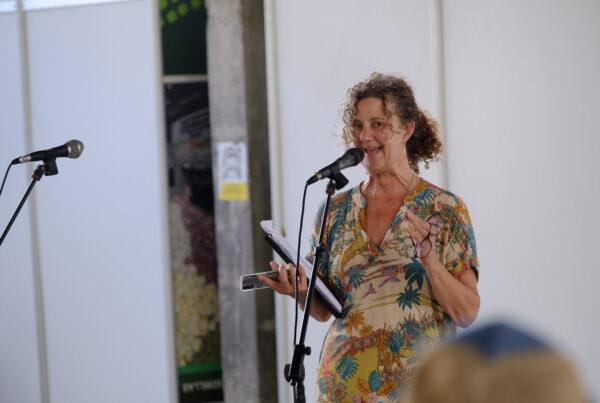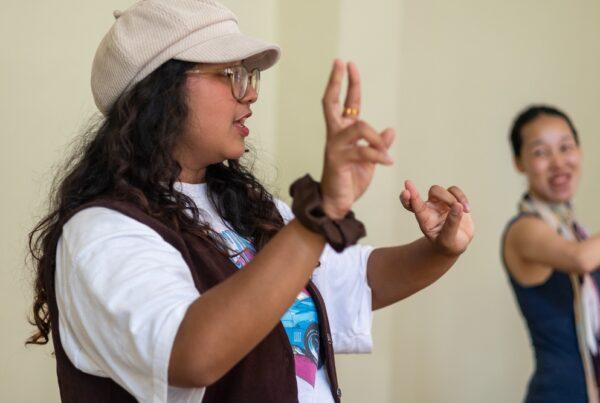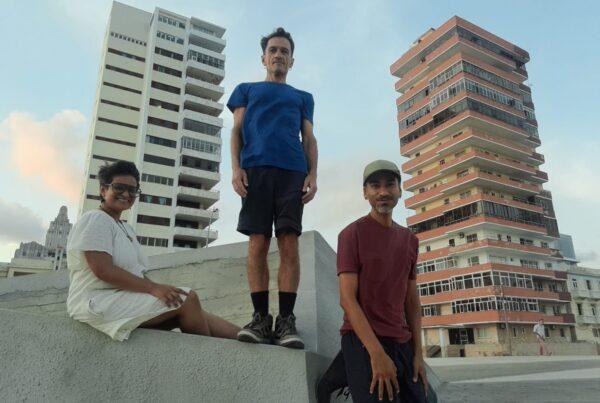16 young people ventured into the Voices of Teenagers: Sustainability & Participation programme this week.
Equipped with previous experience in performing arts through drama schools, the teens where called on to deepen their knowledge and experience in performing arts.
“During the selection process of applicants, a group of young people with varying interests and skills, from various cities and school backgrounds (philological and mathematical orientations, stage design, economics, etc.), was chosen to strengthen the focus group’s ability to exchange diverse experiences and collaborate as a group,” says Sandra Maksimović, facilitator of the programme. “This diverse group aimed to map different places and experiences of young people in the country,” she adds, “and the work began with team-building workshops, where young participants from Italy and Denmark, part of the ForesTEEN programme, also took part,” she adds.
To this end, the youth engaged in discussions, panels, and roundtable sessions, watched selected plays and performances and had conversations and debates with mentors. “During one of the workshops, teenagers formed working groups, and young individuals contemplated the changes that could enhance the position of arts for young people in the region, as well as theatre reception,” explains Sandra. “Some ideas that came out of these interactions included strengthening the connection between theatre and schools by introducing mandatory visits and the opportunity to experience exchanges, providing free programmes and tickets, forming a stronger youth-led theatre critique, involving young people in the play creation process, selecting topics that interest young audiences (hence the strong impressions of the play Yes Yes Yes), and engaging in discussions with young professional,” adds Sandra.

From her own perspective, Sandra reaffirms her understanding of how much young people understand things that are happening around them.
“Even though I already knew this since I work with young people in my drama group Kulturocyclin in Kruševac, during these workshops, I how much young people understand things happening around them, how ready they are to be active in their local community and change things. They have such a strong vision!,” asserts Sandra. “For me, this project underlines how important it is for us to collaborate and learn from each other; and how crucial it is to create active communities as the core of social change,” she adds.
As for young people, Sandra puts forward that it is “of the greatest importance for young people to watch quality plays, to have a safe space where they can feel seen, and represented, to feel less lonely. During puberty, we think that we are the only ones that feel in a certain way, but youth theatre could give them comfort, and teach teenagers how to deal with emotions and thoughts. This workshop just confirmed all the above, and I can only hope someone will hear their wishes and take some action,” concludes Sandra.

Reflections from the youth
“I applied for the workshop in order to meet some people with the same interest and find out how theatre functions in Serbia and abroad, the insights gave me an idea about what we could do here.”
“I learnt a lot about theatre in Germany, I heard about a festival in Germany called Theatre festival for young audiences where selectors and juries are young people. During our workshop, we talked about the potential to make a similar festival on our own in Serbia. We were imagining so deeply that we got to the idea that maybe we can also make our own theatre, not just a festival. That theatre would be run by us and we would decide what would be put on the stage.”
“For the first time, somebody asked up what we think about theatres and due to that, for the first time, I thought maybe, I can be a game changer in the field of theatre in our society.”
“During our workshop we had an exercise where we had to imagine three working groups: theatre, audience, society (including media and school) and what each work group could to improve TYA.”
The programme was facilitated by Sanda Maksimović and Tijana Grumić.
Sandra Maksimović is professor of Serbian Language and Literature (Faculty of Philology, University of Belgrade), winner of the award Best Educator of Serbia 2020 awarded by the Association Živojin Mišić, drama pedagogue and Head of the Drama Studio of the Elementary School Sveti Sava in Kruševac and the informal artistic initiative Kulturocyclin.
Tijana Grumić is a playwright, Assistant Professor at the Dramaturgy Department of the Faculty of Dramatic Arts in Belgrade, Co-founder of the regional platform ‘From the First Step’, dedicated to the development and affirmation of theatre for TYA in the region.


Her most recent book, Amir’s Blue Elephant, a creative non-fiction based on her experiences working in the Moria refugee camp in Lesvos, Greece and Cyprus. In 2018, she launched the My Cyprus Mandala Series, colouring books inspired by the natural and cultural heritage of Cyprus. In 2007, she published her first children’s book in both English and Greek entitled Crocodile, which won the Cyprus State Illustration Award. In 2012, she launched her second children’s book Flying across Red Skies (in English and Greek), using an experimental approach to literature, for which she was nominated for the Cyprus State Literary award. Her third, similarly well-received children’s book was Pupa (Greek and English), published in 2014 and was adapted as a theatre play in 2019. In between her last two books, she published her first free-verse poetry book entitled Come-forth. In 2019 she was contributing author to the anthology Nicosia Beyond Barriers: Voices from a Divided City, published by Saqi Books, London.





